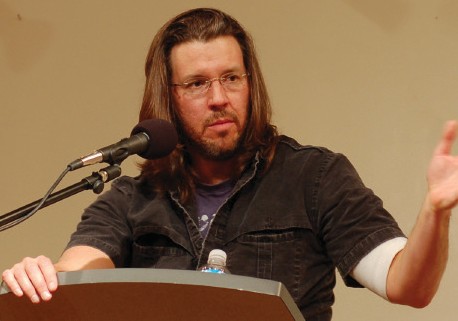David Foster Wallace (1962 – 2008)

David Foster Wallace, 2006
Photographer | Steve Rhodes
Source | Wikimedia Commons
License | CC SA 2.0
David Foster Wallace was born in Ithaca, New York, but was raised in Urbana, Illinois. The son of two academics, his father, James Donald Wallace, was a philosophy professor at the University of Illinois, while his mother, Mary Jean Foster, was an English professor at Parkland College. During his youth, Wallace was a regionally ranked junior tennis player (an interest that would emerge as a subject in many of his writings). Wallace attended Amherst College, where he majored in both English and Philosophy. His first novel, The Broom of the System (1987), was based on his undergraduate thesis. After his undergraduate studies, Wallace enrolled at the University of Arizona, where he earned his M.F.A. in fiction; he then enrolled in a philosophy graduate program at Harvard University before dropping out during his first semester and admitting himself into a mental institution. From this time onward, Wallace began to take a greater interest in fiction, especially postmodern fiction, reading writers such as John Barth and Donald Barthleme, who were influential on his writing.
Wallace’s debut novel, The Broom of the System, led to several influential publications, yet, it was his novel, Infinite Jest (1996), which earned him universal accolades, including landing him on the cover of Time Magazine. It also earned him the MacArthur Genius Grant (1997). Considered one of the greatest novels in the last fifty years, Infinite Jest deals with popular themes found in Wallace’s work, such as addiction and media’s growing influence in our culture.
Wallace was a rare writer, who wrote about a variety of topics, ranging from tennis, to writing the first critical study of rap, to a book on the concept of infinity. In 2004, he married painter Karen Green and, in 2008, after years of dealing with clinical depression, Wallace committed suicide. Posthumously, his estate published the novel The Pale King (2011) which was a finalist for the Pulitzer Prize. Since his suicide, Wallace has captivated the public and been the subject of countless essays and features. In 2009, Jon Krasinski adapted a film version of Wallace’s book Brief Interviews with Hideous Men. In 2015, a film based on David Lipski’s book length interview with Wallace, Although in the End You End Up Becoming Yourself (2010), was released under the title, At the End of the Tour.
“Consider the Lobster,” originally published in Gourmet magazine, is a great example of Wallace’s mass appeal, his ability to write about a seemingly simple event, a Lobster Festival, with humor and nuance, while uncovering the complex issues that arise from the festival. In many ways, Wallace’s commencement speech to Kenyon College, “This is Water” (2005), later published as a stand-alone book, This is Water (2009), perfects that approach of writing for a mass audience. “This is Water” is said to be the culmination of his common themes as a writer, the most important of which is sincerity. In the speech, Wallace reminds audiences that although we all tend towards narcissism, it is important to try to be altruistic. Other themes found in Wallace’s work include a growing concern with our changing culture, the increasing presence of media, as well as the effects of addiction.
“This is Water”
Please click the link below to access this selection:
http://www.metastatic.org/text/This%20is%20Water.pdf
“Consider the Lobster”
Please click the link below to access this selection:
http://www.columbia.edu/~col8/lobsterarticle.pdf
Reading and Review Questions
- What does the title “This is Water” mean? How does this title emerge as a main theme of his speech?
- What does Wallace mean by “default mode”? For example, how, according to Wallace, can our default mode be dangerous? Why does Wallace feel this is such an important lesson for graduates?
- Examine the structure of “Consider the Lobster.” How does Wallace develop his argument about the ethos of eating lobster? What is his argument?
- How do you think the original readers of Gourmet, where “Consider the Lobster” was first published, reacted to this essay? Why do you think they printed it?

